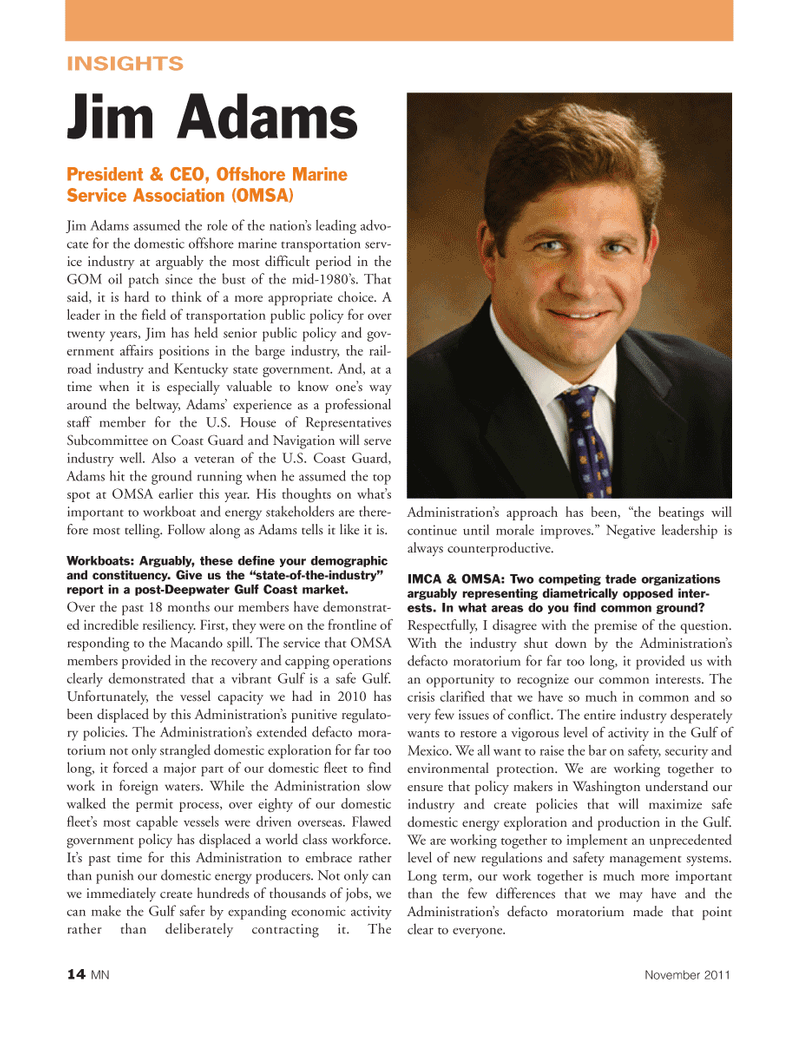
Page 14: of Marine News Magazine (November 2011)
Workboat Annual
Read this page in Pdf, Flash or Html5 edition of November 2011 Marine News Magazine
14MNNovember 2011INSIGHTSJim Adams assumed the role of the nation?s leading advo- cate for the domestic offshore marine transportation serv- ice industry at arguably the most difficult period in the GOM oil patch since the bust of the mid-1980?s. That said, it is hard to think of a more appropriate choice. A leader in the field of transportation public policy for over twenty years, Jim has held senior public policy and gov- ernment affairs positions in the barge industry, the rail- road industry and Kentucky state government. And, at a time when it is especially valuable to know one?s way around the beltway, Adams? experience as a professional staff member for the U.S. House of Representatives Subcommittee on Coast Guard and Navigation will serve industry well. Also a veteran of the U.S. Coast Guard, Adams hit the ground running when he assumed the top spot at OMSA earlier this year. His thoughts on what?s important to workboat and energy stakeholders are there- fore most telling. Follow along as Adams tells it like it is. Workboats: Arguably, these define your demographic and constituency. Give us the ?state-of-the-industry? report in a post-Deepwater Gulf Coast market. Over the past 18 months our members have demonstrat- ed incredible resiliency. First, they were on the frontline of responding to the Macando spill. The service that OMSA members provided in the recovery and capping operations clearly demonstrated that a vibrant Gulf is a safe Gulf. Unfortunately, the vessel capacity we had in 2010 has been displaced by this Administration?s punitive regulato- ry policies. The Administration?s extended defacto mora- torium not only strangled domestic exploration for far toolong, it forced a major part of our domestic fleet to find work in foreign waters. While the Administration slow walked the permit process, over eighty of our domestic fleet?s most capable vessels were driven overseas. Flawed government policy has displaced a world class workforce. It?s past time for this Administration to embrace rather than punish our domestic energy producers. Not only can we immediately create hundreds of thousands of jobs, we can make the Gulf safer by expanding economic activity rather than deliberately contracting it. The Administration?s approach has been, ?the beatings will continue until morale improves.? Negative leadership is always counterproductive. IMCA & OMSA: Two competing trade organizations arguably representing diametrically opposed inter- ests. In what areas do you find common ground? Respectfully, I disagree with the premise of the question. With the industry shut down by the Administration?s defacto moratorium for far too long, it provided us with an opportunity to recognize our common interests. The crisis clarified that we have so much in common and so very few issues of conflict. The entire industry desperately wants to restore a vigorous level of activity in the Gulf of Mexico. We all want to raise the bar on safety, security and environmental protection. We are working together to ensure that policy makers in Washington understand our industry and create policies that will maximize safe domestic energy exploration and production in the Gulf. We are working together to implement an unprecedented level of new regulations and safety management systems. Long term, our work together is much more important than the few differences that we may have and the Administration?s defacto moratorium made that point clear to everyone. Jim AdamsPresident & CEO, Offshore Marine Service Association (OMSA)MN#11 (1-17):MN 2011 Layouts 10/28/2011 3:25 PM Page 14

 13
13

 15
15
